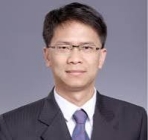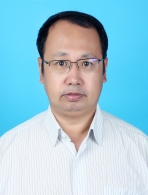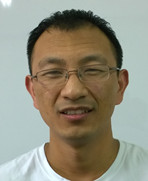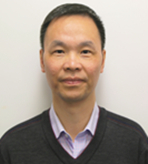Draft Full Paper Due:
Apr. 05, 2026
Notification of Draft Paper Acceptance:
Apr. 25, 2026
Final Manuscript Due:
May. 15, 2026
Author Registration Deadline:
May. 15, 2026
Conference Dates:
Sept. 04-06, 2026

Prof. Jiwen Lu
Tsinghua University

Prof. Ke Lu
University of Chinese Academy of Sciences

Prof. Bin Xiao
Chongqing University of Posts and Telecommunications

Prof. James Tin-Yau KWOK(IEEE Fellow)
Hong Kong University of Science and Technology
James Kwok is a Professor in the Department of Computer Science and Engineering, Hong Kong University of Science and Technology. He is an IEEE Fellow. He has served / is serving as an Associate Editor for the IEEE Transactions on Neural Networks and Learning Systems, Neural Networks, Neurocomputing, Artificial Intelligence Journal, Machine Learning journal, and International Journal of Data Science and Analytics. He is also serving as Senior Area Chairs of major machine learning / AI conferences including NeurIPS, ICML, ICLR, IJCAI. He is on the IJCAI Board of Trustees. He is recognized as the Most Influential Scholar Award Honorable Mention for "outstanding and vibrant contributions to the field of AAAI/IJCAI between 2009 and 2019". Prof Kwok is the IJCAI-2025 Program Chair.
Speech Title: "Vision-Language Models: Tuning and Trustworthiness"
Abstract: Vision-language models (VLMs) are now widely
used in various vision-language modeling tasks. However,
there are still a number of challenges. For example, during
fine-tuning, multiple models with various hyperparameter
configurations are often created, but typically only one of
these models is actually utilized in the downstream task.
Moreover, empirically, vision-language models are more
vulnerable to jailbreak attacks than their LM predecessors.
To address the first issue, we consider the learned soup,
which combines all fine-tuned models with learned weighting
coefficients. While this can significantly enhance
performance, it is also computationally expensive. We
propose to mitigate this by formulating the learned soup as
a computationally-efficient hyperplane optimization problem
and employing block coordinate gradient descent to learn the
mixing coefficients. Finally, to construct robust VLMs, we
propose a training-free protecting approach that exploits
the inherent safety awareness of LLMs, and generates safer
responses via adaptively transforming unsafe images into
texts to activate the intrinsic safety mechanism of
pre-aligned LLMs in VLMs.

Prof. Moncef Gabbouj(IEEE Fellow)
Tempere University, Finland
Dr. MONCEF GABBOUJ received his BS degree in electrical engineering in 1985 from Oklahoma State University, Stillwater, and his MS and PhD degrees in electrical engineering from Purdue University, West Lafayette, Indiana, in 1986 and 1989, respectively. Dr. Gabbouj is a Professor of Signal Processing at the Department of Computing Sciences, Tampere University, Tampere, Finland. He was Academy of Finland Professor during 2011-2015. He was a visiting professor at the Departments of Electronic and Computer Engineering and Computer Science and Engineering, Hong Kong University of Science and Technology, Hong Kong. Dr. Gabbouj was on sabbatical leave as a visiting scholar at the Viterbi School of Engineering, University of Southern California, Los Angeles, California, during spring 2012, a visiting professor at the School of Electrical and Computer Engineering of Purdue University, West Lafayette, Indiana during fall 2011, and a visiting professor at the American University of Sharjah, UAE in 2007-2008. He was Head of the Department during 2002-2007. Dr. Gabbouj was Senior Research Fellow of the Academy of Finland during 2007-2008 and 1997-1998. He is the co-founder and past CEO of SuviSoft Oy Ltd. From 1995 to 1998 he was a Professor with the Department of Information Technology of Pori School of Technology and Economics. From 1994 to 1995 he was an Associate Professor with the Signal Processing Laboratory of Tampere University of Technology, Tampere, Finland. From 1990 to 1993 he was a senior research scientist with the Research Institute for Information Technology, Tampere, Finland. Dr. Gabbouj is currently the Finland Site Director of the NSF IUCRC funded Center for Visual and Decision Informatics and a former member of the Science Council of Tampere University of Technology. His research interests include Big Data analytics, multimedia content-based analysis, indexing and retrieval, artificial intelligence, machine learning, pattern recognition, nonlinear signal and image processing and analysis, voice conversion, and video processing and coding. Dr. Gabbouj is an IEEE Fellow. He is a member of the IEEE Fourier Award Committee. He is member of the Academia Europaea and the Finnish Academy of Science and Letters. He served as Distinguished Lecturer for the IEEE Circuits and Systems Society in 2004-2005, and Past-Chairman of the IEEE-EURASIP NSIP (Nonlinear Signal and Image Processing) Board. He was chairman of the Algorithm Group of the EC COST 211quat. He served as associate editor of the IEEE Transactions on Image Processing, and was guest editor of Multimedia Tools and Applications, the European journal Applied Signal Processing. He is the past chairman of the IEEE Finland Section, the IEEE Circuits and Systems Society, Technical Committee on Digital Signal Processing, and the IEEE SP/CAS Finland Chapter. Dr. Gabbouj was the General Co-Chair of ICIP 2024 and 2020. He was also Chairman of EUVIP 2014, CBMI 2005, WIAMIS 2001 and the TPC Chair of ISCCSP 2006 and 2004, CBMI 2003, EUSIPCO 2000, NORSIG 1996 and the DSP track chair of the 1996, 2012, 2013 and 2014 IEEE ISCAS. He is also member of EURASIP Advisory Board and past member of AdCom. He also served as Publication Chair and Publicity Chair of IEEE ICIP 2005 and IEEE ICASSP 2006, respectively. Dr. Gabbouj was Honorary Guest Professor of Jilin University, China (2005-2010).
Speech Title: "Image Processing with Advanced ANN based Machine Learning"
Abstract: Rethinking Deep Learning (DL) by reconsidering the core neuron model used in all ANN architectures for image processing applications. DL outperformed many traditional approaches in numerous fields of science. However, DL comes at a price of high computational cost and follows mostly a Blackbox approach. Targeting Green Learning, we aim to develop more computationally efficient Artificial Neural Networks, called Operational Neural Networks as alternatives to conventional Convolutional Neural Networks (CNNs). ONNs can perform any linear or non-linear transformation with a proper combination of “nodal” and “pool” operators. This is a great leap towards expanding the neuron’s learning capacity in CNNs, which thus far required the use of a single nodal operator for all synaptic connections for each neuron. This restriction has been lifted by introducing a superior neuron called the “generative neuron” where each nodal operator can be customized during the training to maximize learning. As a result, the network can self-organize the nodal operators of its neurons’ connections. Self-Organized ONNs (Self-ONNs) equipped with superior generative neurons can achieve diversity even with a compact configuration. We shall explore the use of neural network models equipped with the generative and the super neuron in several image processing applications.

Prof. Badong Chen
Xi'an Jiaotong University
Badong Chen received the Ph.D. degree in Computer Science and Technology from Tsinghua University, Beijing, China, in 2008. He is currently a professor with the Institute of Artificial Intelligence and Robotics, Xi'an Jiaotong University, Xi'an, China. His research interests are in machine learning, artificial intelligence, brain computer interfaces and robotics. He has authored or coauthored over 300 articles in various journals and conference proceedings (with h-index 58), and has won the 2022 Outstanding Paper Award of IEEE TCDS. Dr. Chen serves (or has served) as an Associate Editor for several journals including IEEE TNNLS, IEEE TCDS, IEEE TCSVT, Neural Networks and Journal of The Franklin Institute.
Speech Title: "Information Theoretic Learning for Brain Machine Interfaces"
Abstract: Information theory has attracted increasing attention in the fields of machine learning and signal processing in recent years. Novel information theoretic approaches have been proposed for different learning problems, such as supervised learning with the minimum error entropy (MEE) criterion, and representation learning with the information bottleneck (IB) principle. This talk introduces the basic principles and paradigms of information theoretic learning (ITL), and discusses the applications in brain machine interfaces (BMIs).

Prof. Min Liu
Hunan University
Min Liu is the Level-2 Professor at the National Engineering Research Center of Robot Visual Perception and Control Technology, Hunan University, Changsha, China. His research interests include robot vision and pattern recognition. He has published 41 papers as the first or corresponding author in IEEE Transactions, and is an associate editor of IEEE Transactions on Neural Networks and Learning Systems. He has undertaken several national and provincial major projects, including the National Key R&D Program of China, the Key Program of the National Natural Science Foundation of China, the National Key R&D Program for International Cooperation, etc. He has won the First Prize of Scientific and Technological Progress Award in the China Society of Image and Graphics (1st/10), the Second Prize of National Teaching Achievement Award (2nd/10) and 5 other provincial and ministerial level awards.
Speech Title: "Multimodal Perception for Intelligent Surgical Robots"
Abstract: The research on the intelligence of surgical robots is of great significance for improving the technological competitiveness of the cutting-edge digital medical equipment in China. Existing surgical robots lack an effective multimodal surgical target collaborative perception system, and their surgical quality in complex scenes is severely restricted. Aiming at solving the above challenging problems, this talk introduces the basic principles and the key methods of multimodal perception for surgical robots from preoperative, intraoperative to postoperative, and show some of the progress our team has made so far.

Assoc. Prof. Battista Biggio
University of Cagliari
Battista Biggio (MSc 2006, PhD 2010) is Associate Professor at the University of Cagliari, Italy, and co-founder of the cybersecurity company Pluribus One. He has provided pioneering contributions in machine-learning security, playing a leading role in this field. His seminal paper on “Poisoning Attacks against Support Vector Machines” won the 2022 ICML Test of Time Award. His work on “Wild Patterns” won the 2021 Best Paper Award and Pattern Recognition Medal from Elsevier Pattern Recognition. He has managed several research projects, and regularly serves as a PC member for ICML, NeurIPS, and USENIX Security. He chaired IAPR TC1 (2016-2020), co-organized S+SSPR, AISec and DLS, and served as Associate Editor for IEEE TNNLS, IEEE CIM, and Pattern Recognition. He is a senior member of IEEE and ACM, and a member of IAPR and ELLIS.
Speech Title: "Machine Learning Security: Lessons Learned and Future Challenges"
Abstract: In this talk, I will briefly review some recent advancements in machine learning security with a critical focus on the main factors which are hindering progress in this field. These include the lack of an underlying, systematic, and scalable framework to properly evaluate machine-learning models under adversarial and out-of-distribution scenarios, along with suitable tools for easing their debugging. The latter may be helpful to unveil flaws in the evaluation process, as well as the presence of potential dataset biases and spurious features learned during training. I will finally report concrete examples of what our laboratory has been recently working on to enable a first step towards overcoming these limitations, in the context of Android and Windows malware detection.

Assoc. Prof. Miguel Bordallo López
University of Oulu
Miguel Bordallo López, is Associate Professor of Vision Systems Engineering at the Center for Machine Vision and Signal Analysis (CMVS). He received his doctoral degree in 2014 from the University of Oulu, Finland. Currently, he leads the Multimodal Sensing team, that focuses on using real time computer vision and radio technologies to sense humans. He also works as Senior Scientist (AI) at VTT Technical Research Centre of Finland. Assoc Prof. Bordallo actively participate in two Academy of Finland Flagships, the Finnish Center for Artificial Intelligence and 6G-Flagship, where he coordinates the research area in Distributed Intelligence.
Speech Title: "Transforming Primary Healthcare using Multimodal Computer Vision"
Abstract: Camera-based automated medical diagnosis assistance is an emerging topic of interest as it provides a remote alternative to traditional primary healthcare, since it does not necessarily require personal visits to the health centers. Computer vision and AI can leverage remote and mobile video data, and they can assist in providing unobtrusive and objective information in a patient's condition. Up to 30 medically relevant symptoms or conditions can be detected or at least assessed objectively using computer vision methods and facial images. Although many advanced computer vision based healthcare and medical diagnosis methods have been demonstrated, their actual implementations as embedded or remote solutions, if existing, are still far from being useful. The problem derives from the implementation challenges arising from explainability, real time computations, communications and cost issues. This talk shows how we could enable the use of computer vision for medical diagnosis using camera-based devices (such as mobile phones) or remote video connections (e.g. video-conference services), embracing the challenges and particularities that derive from real world scenarios.

Prof. Wangmeng Zuo (H-index: 78)
Harbin Institute of Technology
Wangmeng Zuo is currently a Professor in the School of Computer Science and Technology, Harbin Institute of Technology. He received the Ph.D. degree in computer application technology from the Harbin Institute of Technology, Harbin, China, in 2007. His current research interests include image enhancement and restoration, image and face editing, object detection, visual tracking, and image classification. He has published over 100 papers in top tier academic journals and conferences. His publications have received 30,000+ citations in terms of Google Scholar. He has served as Area Chairs for ICCV 2019, CVPR 2020/2021, ECCV 2022, and is currently an Associate Editor of IEEE Trans. Pattern Analysis and Machine Intelligence, and IEEE Trans. Image Processing.
Speech Title: "Learning Deep Image Restoration Network: From Full- and Self-supervision to Non-ideal Supervision"
Abstract: Deep learning has made unprecedented success in many computer vision tasks, which largely depends on massive well annotated data. However, the annotation cost is expensive and laborious, making unsupervised/self-supervised learning as feasible alternatives for training deep networks. In this talk, we first introduce a novel self-supervised method by learning both noise model and deep denoising network. Subsequently, we present a self-supervised adaptation model for adapting a denoising network to new domains and devices. Then, we show that the ideal ground-truth images are not available for deep ISP and Raw super-resolution, and present our alternative solution for learning deep networks with non-ideal supervision (e.g., color inconsistency and spatial deformation). Finally, we discuss the potential to incorporate self-supervised learning and multiple sensors for learning deep image restoration models.

Prof. Huiyu Zhou
University of Leicester
Prof. Huiyu Zhou received a Bachelor of Engineering degree in Radio Technology from Huazhong University of Science and Technology of China, and a Master of Science degree in Biomedical Engineering from University of Dundee of United Kingdom, respectively. He was awarded a Doctor of Philosophy degree in Computer Vision from Heriot-Watt University, Edinburgh, United Kingdom. Prof. Zhou currently is a Full Professor at School of Computing and Mathematical Sciences, University of Leicester, United Kingdom. He has published over 400 peer-reviewed papers in the field. He was the recipient of "CVIU 2012 Most Cited Paper Award", “MIUA 2020 Best Paper Award”, “ICPRAM 2016 Best Paper Award” and was nominated for “ICPRAM 2017 Best Student Paper Award” and "MBEC 2006 Nightingale Prize". Dr. Zhou serves as the Editor-in-Chief of Recent Advances in Electrical & Electronic Engineering and Associate Editor of IEEE Transaction on Human-Machine Systems, IEEE Journal of Biomedical and Health Informatics, Pattern Recognition, PeerJ Computer Science, Security and Safety, Scientific Reports, Machine Intelligence Research, International Journal of Image and Graphics and IEEE Access, and Area Chair of IJCAI, ICRA and BMVC. He has given over 100 invited talks at international conferences, industry and universities, and has served as a chair for 70 international conferences and workshops.
Speech Title: "Transform Image Understanding with Artificial Intelligence"
Abstract: There are many questions to answer in image interpretation and understanding. Uncertainty in image analysis needs strong and powerful modelling tools to describe the objects in the images. Artificial intelligence (AI) plays a very important role in the design of a robust tool for image representation. Using some examples from his own research work on uncertainty analysis, he will explore how AI can stimulate new concepts or development of dealing with complicated problems and lead to novel adventures through these applications.
